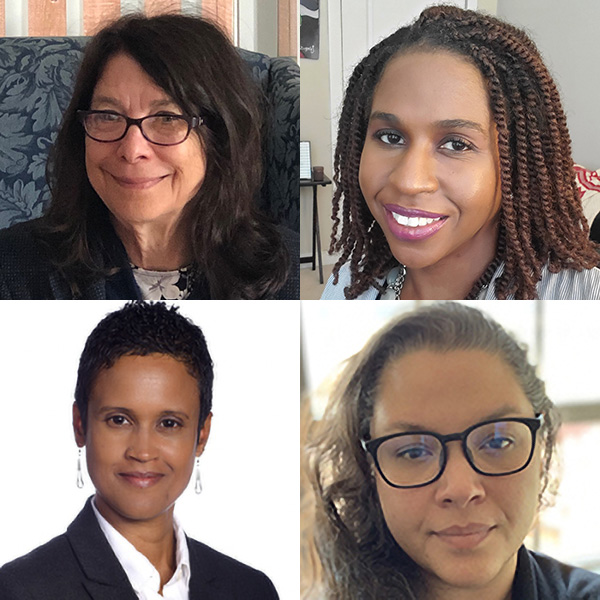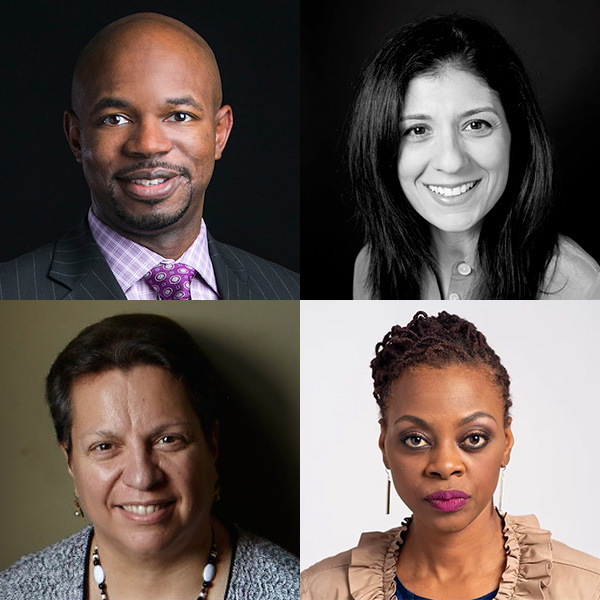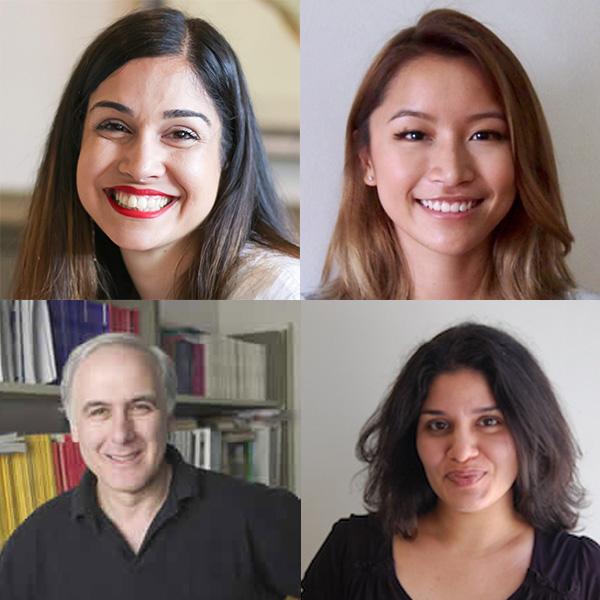No one has been keeping records, but it seems a safe bet that Friday’s online conference “Decolonizing Psychology Training: Strategies for Addressing Curriculum, Research Practices, Clinical Supervision, and Mentorship” has shattered all marks for attendance at a happening at Teachers College.
For weeks, those working on the event watched in amazement as registration numbers steadily rose.
“We thought we’d get a couple of hundred people, but literally every day another hundred or so people register,” says Olivia Khoo, a fourth-year School Psychology doctoral student.
In late March, the count stood at 800. A week later it was approaching 2,000. And this week, on the eve of the event, 5,100 people had registered to attend.
[The “Decolonizing School Psychology” conference took place on April 16th. Visit TC’s YouTube page to watch the videotaped proceedings. The event was funded by the American Psychological Association Board of Educational Affairs, with additional support from TC’s Department of Health & Behavior Studies and Office of College Events.]
There are a lot of explanations for those eye-popping totals. The event has benefited from the extensive contacts of faculty organizer Prerna Arora, Assistant Professor of Psychology & Education, a leader in focusing the field on the needs of students of color and those from immigrant backgrounds, and it has since been widely publicized by students in TC’s School Psychology program. The stellar cast of speakers included Howard University’s Celeste Malone, President-Elect of the National Association of School Psychologists; the University of Minnesota’s Amanda Sullivan, Senior Editor of the journal School Psychology Review; UCLA psychologist Carol Falender, co-author of Clinical Supervision: A Competency-Based Approach; and Bucknell University psychologist Jasmine A. Mena, co-author of Integrating Multiculturalism and intersectionality Into the Psychology Curriculum: Strategies for Instructors. Of the latter two speakers, Arora says, “These are the people who literally wrote the books on these topics — supervision and decolonizing curriculum in psychology.”

GO-TO SOURCES The conference's speakers are top experts in the field. Clockwise from left: UCLA psychologist Carol Falender; Celeste Malone, President-Elect of the National Association of School Psychologists; University of Minnesota psychologist Amanda Sullivan; Bucknell University psychologist Jasmine Mena. (Photos: TC Archives)
Four other TC faculty members who are widely known for social justice work in their own fields served as moderators: Marie Miville, Professor of Psychology & Education and Vice Dean for Faculty Affairs; Professor of Psychology & Education Laudan Jahromi, Chair of the Department of Health & Behavior Studies and Director of the Program in Intellectual Disabilities/Autism; Mark Gooden, Christian Johnson Endeavor Professor of Education Leadership, and Yolanda Sealey-Ruiz, Associate Professor of English Education, founder and faculty sponsor of the College’s Racial Literacy Roundtables Series and co-founder of the Teachers College Civic Participation Project. Arora, coauthor during summer 2020 of a widely endorsed School Psychology Unified Anti-Racism Statement and Call to Action, and TC President Thomas Bailey delivered the conference’s opening remarks, and Arora spoke again to close out the day.

SOCIAL JUSTICE LEADERS Clockwise from top left: TC faculty members Mark Gooden (school leadership), Laudan Jahromi (Intellectual Disabilities/Autism), Yolanda Sealey-Ruiz (English Education) and Marie Miville (counseling psychology) moderated sessions at the conference. (Photos: TC Archives)
Still, there are lots of events with great lineups and good marketing that don’t attract 5,100 people. The consensus is that a much bigger story is unfolding here: a case of the right topic being addressed at very much the right time — at TC, in the field of school psychology, and for the nation and the world.
The conference is extraordinarily timely. It’s focused very clearly on the issue of promoting equity in a way that everybody gets treated fairly. And that’s really the issue facing our society in so many areas, from school curricula to property taxes and their relationship to school funding to equality before the law in all respects.
— Stephen Peverly, Professor of Psychology & Education and Director of TC's Program in School Psychology
“The conference is extraordinarily timely,” says Stephen Peverly, Professor of Psychology & Education and School Psychology program director. “It’s focused very clearly on the issue of promoting equity in a way that everybody gets treated fairly. And that’s really the issue facing our society in so many areas, from school curricula to property taxes and their relationship to school funding, to equality before the law in all respects.”
Long in the Making
The impetus for the conference began in spring 2020, soon after the killing of George Floyd by Minnesota police sparked massive demonstrations across the United States and in other countries.
“A group of us students started saying, what can we do in our School Psychology program around these issues?” recalls Kayla Parr, a third-year doctoral student in the program. “We said ‘Let’s write recommendations for incorporating racial and social justice into our program.’ We put out a call on a Friday and on Monday, 25 graduate students showed up.”
During that brainstorming session, the group identified five action items:
- Creating a diversity committee within the program
- Creating more training opportunities for students and faculty
- Expanding the curriculum to integrate additional content related to racial and social justice
- Recruiting and retaining more students who are Black, indigenous or people of color (BIPOC)
- Increasing outreach to the surrounding community and engaging the community in the department’s work
Our goal was to say: We have this incredible program, and here are ways to make it explicitly anti-oppressive by incorporating more of an emphasis on racial and social justice.
— Kayla Parr, third-year School Psychology doctoral student
Over the summer, the students divided into five teams to work on those goals. They conducted literature reviews of other programs, surveyed their fellow students and recent alumni of TC’s program and spoke with faculty members at TC and beyond for input. In Fall 2020, they presented the department with a 100-page proposal, outlining key recommendations in each of the five areas.

FRUITFUL DIALOGUE Clockwise from left: TC School Psychology doctoral students Kayla Parr and Olivia Khoo and faculty members Prerna Arora and Stephen Peverly. Arora organized the conference in response to proposals for change from Parr, Khoo and other students. Peverly, the program director, and Arora have opened up their course syllabi to suggestions from students. (Photos: TC Archives)
“Our goal was to say: We have this incredible program, and here are ways to make it explicitly anti-oppressive by incorporating more of an emphasis on racial and social justice,” Parr says. “The biggest thing we want to shift is the culture, so that there’s an integration of anti-oppressive frameworks into the program, psychology and higher ed generally — theories and frameworks such as critical race theory and minority stress theory, which center the experiences of BIPOC and individuals from immigrant backgrounds. We want multiculturalism and intersectionality to be something that’s integrated throughout the curriculum as the lens through which we view our work in the field.”
The students really inspired me to think about what we could do to address the kinds of changes that need to be made. I was doing a lot of research on curriculum, clinical supervision and mentorship, and it just struck me — ‘Wouldn’t it be great if I could get these experts to actually come speak to us?’ And then ‘Why not also share it with everyone in the field?’
— Prerna Arora, Assistant Professor of Psychology & Education
The result, faculty and students agree, has been a new and ongoing dialogue — collegial and productive, but at times also challenging for all involved.
“All our faculty said we’re proud of your hard work in putting this together — we’re on board with what this work represents,” Parr says. “But discussion around anti-racism and anti-oppression can be challenging. Some students have felt afraid of being typecast as ‘angry BIPOC students.’ And some faculty have felt worried about being vilified if they say something wrong. But, we’re dialoguing and we’re starting to get more comfortable. It’s a work in progress.”
Peverly agrees. “There are a lot of inequities in many places. Schools are one of them, and school psychology itself is one of them. A majority of the people working in our profession are white women, although the composition of our incoming cohorts at TC is becoming much more diverse. So, I think the enthusiasm of our students and what they are trying to do is wonderful. But change is always difficult. It takes time to accommodate, and some people want to move very quickly and others a little more deliberately.”
Change on Many Fronts
Regardless of how people feel about the pace, changes have been happening. The program has created a biweekly Diversity, Equity and Inclusion Collective made up of students, faculty and alumni, and students from the Collective now regularly attend School Psychology faculty meetings.
At online admissions events for both the Ph.D. and master’s programs, in addition to faculty presentations on program logistics and expectations, applicants now hear from current students about what daily student life is like, what funding and mental health supports are available, and progress on work focused on race and diversity.
We’re disseminating knowledge to people who clearly are hungry for it. If I don’t know how to ride a bike, I won’t ride a bike. But knowing how to take action will galvanize action.
— Olivia Khoo, fourth-year School Psychology doctoral student
Thanks in large part to help from Arora, students in the program are also getting new professional opportunities. This spring, a group of students published a paper in The School Psychologist, which is produced by Division 16 of the American Psychological Association, titled “How to Be an Antiracist: A School Psychology Starter Pack.”
In addition, at least two faculty members — Arora and Peverly — have opened up their course syllabi to student input.
“Curricular changes are a critical step in dismantling harmful systems. I’ve worked on syllabi revisions with Dr. Arora and Dr. Peverly,” Parr says. “And also talking with my department chair, Dr. Jahromi, about how students and faculty can collaboratively engage in this work at the department level, especially following the learnings from the conference.”
Peverly, who has taught at TC for 35 years, says he looks at that work as part of an ongoing process in his own evolution as a scholar.
“Changing my syllabus in response to students is not a new experience for me,” he says. “In the past, I’ve opened up my courses to students from other programs, and they’ll say, ‘You know, I was hoping I’d learn X or Y.’ And if it fits, I’ll put that in, because I end up learning more too.”
Seeking Lasting Change
But without a doubt the biggest change thus far that’s been sparked by the students’ proposal is the “Decolonizing Psychology” conference itself, which Arora conceived of, obtained the funding for and organized.
“The students really inspired me to think about what we could do to address the kinds of changes that need to be made,” Arora says. “I was doing a lot of research on curriculum, clinical supervision and mentorship, and it just struck me — ‘Wouldn’t it be great if I could get these experts to actually come speak to us?’ And then ‘Why not also share it with everyone in the field?’”
Arora used some of the grant money to bring on Parr and Khoo as partners in preparing for the conference, and she credits them with supporting her throughout the process. Both will also have speaking roles on April 16th.
It’s not clear yet what will follow from the meeting, but Parr says the hope is for both immediate and sustainable impact.
“Typically, after events that catalyze wide-spread action like the murder of George Floyd, there’s a lot of spoken commitment to sustainable change — but then that energy dissipates for many over time,” she says. “Our hope is that the speakers at this event will offer some strategies for how to take what they’re saying and implement it in our day-to-day practice.”
“We’re disseminating knowledge to people who clearly are hungry for it,” Khoo says. “If I don’t know how to ride a bike, I won’t ride a bike. But knowing how to take action will galvanize action.”
